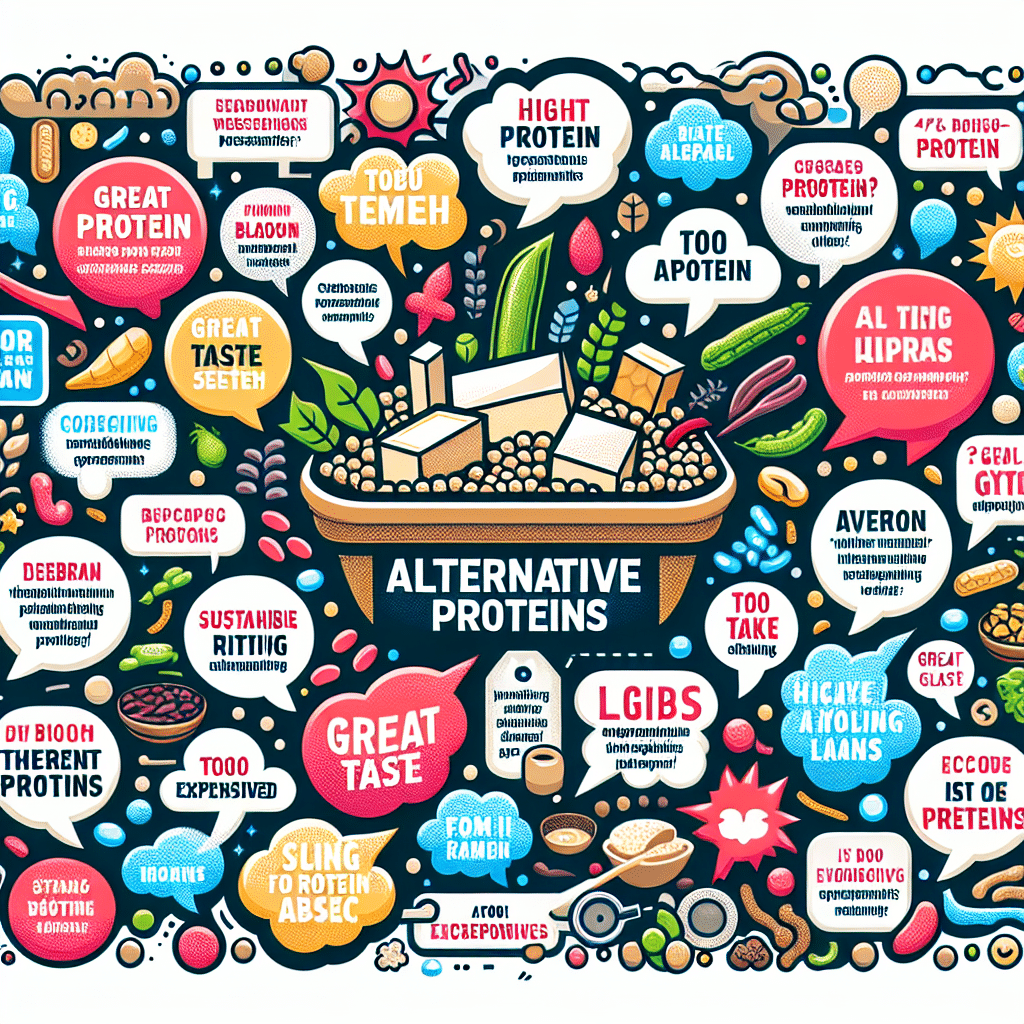How Are Different Alternative Proteins Perceived by Consumers?
-
Table of Contents
- Consumer Perceptions of Alternative Proteins: A Deep Dive
- Plant-Based Proteins: The Rising Star
- Insect-Based Proteins: Overcoming the ‘Yuck’ Factor
- Cultured Meat: The Ethical and Sustainable Choice
- Algae-Based Proteins: The Underexplored Superfood
- Consumer Education and Marketing Strategies
- Conclusion: Embracing the Protein Revolution
- Discover ETprotein’s Range of High-Quality Alternative Proteins
Consumer Perceptions of Alternative Proteins: A Deep Dive

The global food landscape is undergoing a significant transformation as consumers increasingly seek out sustainable and health-conscious options. Alternative proteins, derived from plants, insects, algae, or cultivated in labs, have emerged as a promising solution to meet these demands. However, consumer perceptions of these proteins vary widely, influenced by factors such as taste, nutritional value, environmental impact, and cultural acceptance. This article explores how different alternative proteins are perceived by consumers and what drives these perceptions.
Plant-Based Proteins: The Rising Star
Plant-based proteins, such as soy, pea, and rice proteins, have gained considerable popularity, especially among vegetarians, vegans, and flexitarians. These proteins are often perceived as healthier and more environmentally friendly compared to animal-based proteins. Brands like Beyond Meat and Impossible Foods have successfully positioned their products as not only beneficial for personal health but also for the planet, tapping into the eco-conscious mindset of many consumers.
- Health Benefits: Consumers often associate plant-based proteins with a lower risk of heart disease and other health issues.
- Environmental Impact: The reduced carbon footprint of plant-based proteins compared to livestock is a significant selling point.
- Taste and Texture: Innovations in food technology have improved the taste and texture of plant-based proteins, making them more appealing to a broader audience.
Insect-Based Proteins: Overcoming the ‘Yuck’ Factor
Insect-based proteins, such as cricket flour, are a sustainable protein source with a high nutritional profile. However, consumer acceptance in Western countries is still low due to the ‘yuck’ factor. Cultural norms play a significant role in the perception of insect-based proteins. In contrast, many Asian and African countries have a long history of entomophagy (eating insects), which leads to higher acceptance in those regions.
- Nutritional Value: Insects are rich in protein, vitamins, and minerals, making them a nutrient-dense food source.
- Sustainability: Insects require less land, water, and feed compared to traditional livestock, making them an eco-friendly choice.
- Cultural Acceptance: Efforts to normalize insect consumption through education and appealing product presentation are slowly changing perceptions.
Cultured Meat: The Ethical and Sustainable Choice
Cultured meat, also known as lab-grown or clean meat, is produced by cultivating animal cells in a controlled environment. This technology is still in its infancy, but it holds the promise of meat production without the ethical and environmental issues associated with traditional animal farming. Consumer perception is mixed, with some intrigued by the science and potential benefits, while others are skeptical about the ‘unnatural’ process.
- Ethical Considerations: Cultured meat addresses animal welfare concerns, which is a significant factor for many consumers.
- Environmental Benefits: Reduced greenhouse gas emissions and lower resource usage are key advantages of cultured meat.
- Health and Safety: The controlled production process may lead to safer and cleaner meat products, free from antibiotics and pathogens.
Algae-Based Proteins: The Underexplored Superfood
Algae, including spirulina and chlorella, are considered superfoods due to their high protein content and rich nutrient profile. While not as mainstream as other alternative proteins, algae-based products are gaining traction among health enthusiasts. The perception of algae as a superfood is helping to overcome any initial hesitation among consumers.
- Health Benefits: Algae are packed with antioxidants, vitamins, and omega-3 fatty acids, appealing to health-conscious consumers.
- Sustainability: Algae cultivation has a low environmental impact and can be done on non-arable land.
- Taste: The unique flavor profile of algae can be a hurdle, but it is often masked in processed food products.
Consumer Education and Marketing Strategies
Education and marketing play crucial roles in shaping consumer perceptions of alternative proteins. Companies are investing in campaigns to inform the public about the benefits of these proteins and how they can be incorporated into a balanced diet. Tastings, transparent labeling, and partnerships with chefs and influencers are some strategies used to build trust and acceptance.
Conclusion: Embracing the Protein Revolution
Consumer perceptions of alternative proteins are influenced by a complex interplay of health, environmental, and cultural factors. While plant-based proteins currently lead the market, other sources like insects, cultured meat, and algae are slowly gaining ground as technology advances and consumer awareness grows. The success of alternative proteins hinges on continued innovation, effective communication, and the ability to deliver products that meet consumer expectations in terms of taste, convenience, and price.
Discover ETprotein’s Range of High-Quality Alternative Proteins
If you’re looking to explore the world of alternative proteins, ETprotein offers a diverse selection of high-quality options. Their product range includes organic rice protein, clear rice protein, pea protein, clear pea protein, and various seed proteins, all characterized by a neutral taste and non-GMO, allergen-free attributes. ETprotein’s L-(+)-Ergothioneine (EGT) products, available in different grades, cater to industries such as nutraceuticals, pharmaceuticals, cosmeceuticals, and food and beverage. With a commitment to sustainability and quality, ETprotein is an excellent choice for businesses and consumers alike.
About ETprotein:
ETprotein, a reputable protein and L-(+)-Ergothioneine (EGT) Chinese factory manufacturer and supplier, is renowned for producing, stocking, exporting, and delivering the highest quality organic bulk vegan proteins and L-(+)-Ergothioneine. They include Organic rice protein, clear rice protein, pea protein, clear pea protein, watermelon seed protein, pumpkin seed protein, sunflower seed protein, mung bean protein, peanut protein, and L-(+)-Ergothioneine EGT Pharmaceutical grade, L-(+)-Ergothioneine EGT food grade, L-(+)-Ergothioneine EGT cosmetic grade, L-(+)-Ergothioneine EGT reference grade and L-(+)-Ergothioneine EGT standard. Their offerings, characterized by a neutral taste, non-GMO, allergen-free attributes, with L-(+)-Ergothioneine purity over 98%, 99%, cater to a diverse range of industries. They serve nutraceutical, pharmaceutical, cosmeceutical, veterinary, as well as food and beverage finished product distributors, traders, and manufacturers across Europe, USA, Canada, Australia, Thailand, Japan, Korea, Brazil, and Chile, among others.
ETprotein specialization includes exporting and delivering tailor-made protein powder and finished nutritional supplements. Their extensive product range covers sectors like Food and Beverage, Sports Nutrition, Weight Management, Dietary Supplements, Health and Wellness Products, and Infant Formula, ensuring comprehensive solutions to meet all your protein needs.
As a trusted company by leading global food and beverage brands and Fortune 500 companies, ETprotein reinforces China’s reputation in the global arena. For more information or to sample their products, please contact them and email sales(at)ETprotein.com today.












